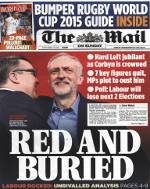Category: Media Ethics
- Details
 Rarely has a peacetime Prime Minister struggling with a national emergency been as fortunate as Boris Johnson in being spared the broad sweep of hostile coverage that proved so debilitating to his predecessors.
Rarely has a peacetime Prime Minister struggling with a national emergency been as fortunate as Boris Johnson in being spared the broad sweep of hostile coverage that proved so debilitating to his predecessors.
Johnson has been blessed with a personal story line tailor-made for the popular press – ‘From death to paternity’ (Daily Mail, 30.4.2020) – and Conservative newspapers have remained his stalwart cheerleaders.
- Details
 When debating the role of broadcasters during the EU Referendum and its aftermath, my prediction has been that Brexit press cheerleaders like the Sun, Daily Mail, Daily Telegraph and Daily Express will become ever more strident once Theresa May has triggered Article 50.
When debating the role of broadcasters during the EU Referendum and its aftermath, my prediction has been that Brexit press cheerleaders like the Sun, Daily Mail, Daily Telegraph and Daily Express will become ever more strident once Theresa May has triggered Article 50.
Little did I know that within days, ultra-Brexiteers such as Iain Duncan Smith, John Redwood and Theresa Villiers would be adding their names to a parliamentary broadside about the anti-Brexit bias of the BBC’s coverage.
Timing was significant because it coincided with the final confirmation that the Prime Minister intended to trigger Article 50 on March 29, 2017;
The Brexiteers’ reasoning in putting the frighteners on the BBC could not have been clearer: they are determined to do all they can to undermine, if not curtail, any attempts by broadcasters to explain the full economic impact of the UK leaving the European single market and customs union.
- Details
 Seeking political opinions from drinkers in the local pub, or from shoppers in the town centre, is a popular device for television and radio journalists and has always had its limitations, but never more so than during the polarised campaign leading up to the European Referendum.
Seeking political opinions from drinkers in the local pub, or from shoppers in the town centre, is a popular device for television and radio journalists and has always had its limitations, but never more so than during the polarised campaign leading up to the European Referendum.
Having spent many years myself collecting vox pops – a staple ingredient for any broadcaster out on the road – I know how unrepresentative these on-the-spot surveys can be.
Perhaps the greatest drawback is that such straw polls are often conducted in the late morning, or early afternoon, having to be completed ahead of time, ready for editing so as to be included in packaged reports to be transmitted in the early or late evening programmes and bulletins.
A major flaw in the practice is that most day-time shoppers or public house customers tend to be retired or self-employed, local tradesmen and the like, a sample that is invariably unrepresentative of the population at large.
This time constraint tends to exclude most if not all those of working-age who are unlikely to be either day-time shoppers or drinkers. The same problem arises on a general election polling day. Invariably TV crews dispatched to get early footage find that most of the morning voters leaving polling stations are pensioners.
- Details
 Coming to terms with the trials and tribulations of leading the Labour Party is proving a steep learning curve for Jeremy Corby, but he has had plenty of training for the media onslaught that he is having to endure.
Coming to terms with the trials and tribulations of leading the Labour Party is proving a steep learning curve for Jeremy Corby, but he has had plenty of training for the media onslaught that he is having to endure.
I know from personal experience as a former BBC political correspondent that Corbyn’s durability under fire should not be underestimated.
His criticism in his acceptance speech of the unacceptable level of media intrusion being experienced by politicians was heartfelt – and something of a premonition given that five days later he was subjected to a frenzy of revelations about his relationship in the 1980s with Diane Abbott, the shadow international development secretary.
But Corbyn has remained steadfast and resolute for the last 30 years in the face of sustained denigration at the hands of Conservative-supporting newspapers and their erstwhile allies in New Labour.
- Details
 “Repeated failure to be impartial” … “in built bias” … these are the favoured lines of attack for Conservative-supporting newspapers as they seek to galvanise the BBC’s opponents for what might become a final, make-or-break assault on the licence fee.
“Repeated failure to be impartial” … “in built bias” … these are the favoured lines of attack for Conservative-supporting newspapers as they seek to galvanise the BBC’s opponents for what might become a final, make-or-break assault on the licence fee.
Battle lines were drawn when Nadine Dorries fired the starting gun in January with her infamous tweet that the most recent “licence fee announcement will be the last”.
